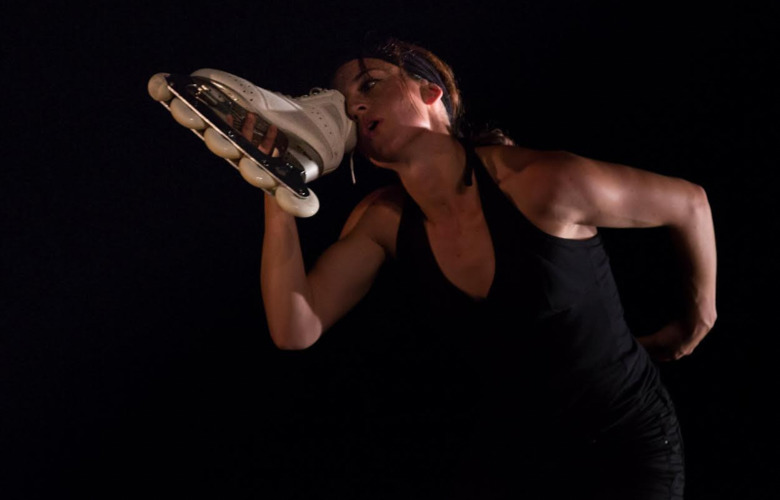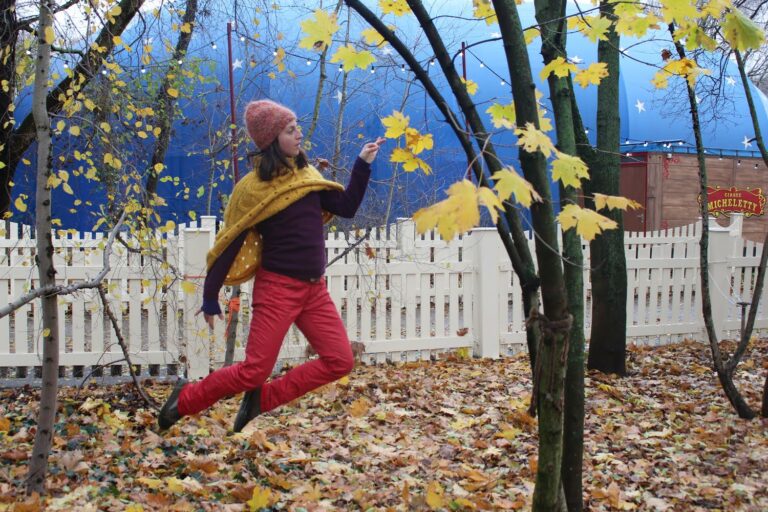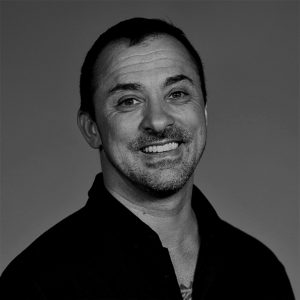
Claire Bournet is an ice skater, a dancer, a choreographer, as well as one of the artistic directors of the unique dance company Trafic de Styles in Paris. In her work, Claire aims to explore ever new means of expression. She battles stereotypes whilst at the same time keeping the essence of her artistic roots as an ice skater. In this article, Claire tells us about her career and her vision.
I was born in a small village in the Pyrenees. I grew up with snow and ice rinks and that is how I naturally got into skating.
My family still lives in the south of France.
However, I left home when I was fifteen to pursue my skating studies and career. First, I went to Paris. Then, when I was twenty years old, I went touring for eight years.
I toured with a Russian show family and, in the first few years, most of the touring was in the UK.
We had a new show every year, every season.
After five years of touring as a performer, I was given the responsibilities of a show manager.
From then on, I had many different tasks. I co-produced a show in Paris Bercy and was put in charge of creating a new division.
This also meant touring abroad, while the main division stayed in the UK. For me this was a welcome change. I wanted to see more of the world. For the next three years, we toured through many different countries. I had my management responsibilities, but also still performed as a skater every now and then.
Mostly, I enjoyed growing into my role as a manager because I had the creative aspect to deal with. I worked on the storyboard, the music, and adaptations.
Often, it was necessary to adapt the show to different countries. For example, the regular length of our show was two hours. But when we were in Abu Dabi, they asked us to shorten it to a half-hour show.
The shows of the company I worked for had a strong identity that allowed them to be very recognizable and sell way. But, after a while, I increasingly felt limited and frustrated with the artistic and creative process.
The corporation management did what they had always done. They used what worked and sold well.
I was twenty-six/twenty-seven at the time. I felt really weary, but didn’t know what to do. The only thing I was sure of was that I needed something different. I needed to go somewhere else to refresh myself.

Arriving with new ideas and concepts is always a risk. You need to have someone who really believes in new ideas. Or, you need to start over with new partners.
So, I left the company I had worked with for eight years and went to Paris. I started contemporary dance classes and signed up for a one-year course.
This is how I met my business partner, Sébastien Lefrançois. He was a former skater and also a dance choreographer with his own company, called Trafic de Styles.
Compared to other choreographers in France he was very unusual. He always used Hip Hop tools in his creations. And, his shows were often collaborations between circus artists, contemporary dancers, actors, mimes, etc. Each show was a mix of many disciplines.
Back then, I saw one of his shows. It was a Hip Hop version of Romeo and Juliet.
When I discovered Sébastien‘s shows, I really felt I could work with him. There wasn’t any skating in Romeo and Juliet for example, but I could feel the influence of skating.
I met with Sébastien and told him I thought we really needed to work together. I wanted to do a creation involving ice skating. But, I wanted to be far away from corporate entertainment. As well as far away from the stereotypes usually associated with ice shows (happy fairy tale world etc.)
Sébastien asked me to finish my contemporary dance course first. So I would get closer to his world, to contemporary creation, so we could meet eye to eye, have a similar language.
We did come together. And, I discovered that combining theatre and ice was something I was really into. Performing in an arena is very different to performing on a theatre stage. I wanted theatre conditions and a small stage to tell our story.
It took us three years to find all partners and funds to create a show together.
We also needed seven artists: three skaters (I was one of them), two contemporary dancers, a clown, and a Hip Hop dancer.
The idea was to meet on the ice pad and see how we are together. Basically, discuss with our bodies, together on the ice pad, to see what will come of it.
Somehow, it was like we were creating a new discipline. Like teenagers, when they go to an empty swimming pool and transform it from a space for swimming to maybe a space for blading, roller skating, BMX, parkours, you name it.
The new disciplines develop alongside the sport. They become the sport, become the art form.
When we were on the ice for the artistic creation of our show, everyone started to have fun on the ice pad. Be it on skates, or blades, or shoes.
In our show, we were telling the story of teenagers having fun, having secret moments in forbidden places. Like when they hide somewhere to smoke, or when they go to the gym at night to hang out.
The name of the show we created is Glace and it has been touring for four years. In France, Switzerland, and Croatia.
We had moments with the audience after each show which were immensely important to us. The audience would come and dance with us on the ice. We had Frozen Ball. The idea was to not build the ice only for the show. We wanted people to be able to get more of an experience out of it. And us too, together with them.
Our production ended up being quite exhausting for me, though. We were eleven on tour.
I was performing as well as working on the production side. And then, of course, there was the element of needing to build the ice wherever we went.
We had big logistics considering that sometimes we only stayed to do one show. When we arrived, it was like the circus came into the village. It was an event.
Over the years, theaters in France were cutting their budgets lower and lower. It felt as if things were becoming increasingly more difficult for us.
I started to get tired of those one-shot sessions and began to lose the initial sense of what we had wanted to achieve with our creation.
Slowly but surely, the moment came for us to think of something lighter to tour with. Something, that wouldn’t have such a high ecological cost as well.
This is how we began working on roller skating.
The creation of this new show was this year, in 2020. We began touring this autumn.
I am very happy with the decision we took to travel light. Our show can be outdoors or indoors. It is a 40-minute show. So, also great for kids, because it’s not too long.
I love the fact that there isn’t too much decor. There aren’t too many props. We do the show only with our bodies and our skills, and a bit of lighting.
And we have a musician. A cello player. But we have a version with recorded music as well, for when she doesn’t have time to come on tour with us. We are very flexible.
Currently, of course, we cannot continue touring because of Covid.
Besides the show itself, we have lots of other projects though. With schools and city councils.
We take big walks through the city together. People can join these walks to either be a model or a photographer, or both. We stop whenever we want to take pictures. We jump, play with the architecture. We put our bodies in relation to our surroundings. And we try to make the walk fun and poetic. Sometimes absurd.
The aim is to try and teach people how to be in a process of creation with their cameras and a body.
We had a three-year residency with the city and a theatre of Sens. And we collaborated with another artist, Yaman Okur, at that time. This got us to thinking about how to create artistic moments with the audience. There are different projects. With different groups of people: kids, the elderly, etc.
We offer them an artistic experience that we plan before we get together with them.
These moments are also artistic laboratories for us. It’s a good compromise. For the audience it is an opportunity to taste our world. And for us it is a good way to observe, feel, and try many things.
To see what works artistically. And what doesn’t. To see what maybe we haven’t considered yet. Ways of artistic expression which might be worth delving deeper into.
We are really enjoying these moments we have, creating with people who are not used to our artistic thought processes, because it sometimes opens up completely new perspectives.
We get closer to the people, the urban spaces, the city. Closer to what is happening in the here and now. It feeds the creation of our shows. Everything is in a process of continual growth.
That being said, our company has experienced massive changes as well.
When Sébastien and I met eight years ago, he was the full-time choreographer and artistic director. He had created Trafic de Styles twenty-five years ago.
Then, two years ago, he felt the conditions he had when he first started out were so much more conducive to the creative process compared to how the situation is nowadays.
He simply got fed up with the system, the administrative work and the growing bureaucracy. And felt the need to free up time for new experiences.
Sébastien needed a new challenge. He always had a special connection to food. A strong passion. He became an artisan baker with a respectful approach towards the environment and the people. Because of how his philosophy developed over time, this new way of life feels more like who he is today.
He is still working in our company as well. Sometimes performing, sometimes choreographing.
He helps me to take over and acts more in the capacity of a consultant. Putting his experience to good use. And he is always there when I need his skills and advice.
Sébastien finds balance working like this, on the artistic side, with less pressure than before.
Overall, the situation is great for me, too. Sébastien had been established for so many years. When I arrived I had to somehow find my place to fit in. Now, I am able to take up more space in the company. I can make decisions I couldn’t make before. I can initiate and lead projects on my own or together with him.
We have found a new balance and are looking forward to continuing our work together.
Official website Trafic de Styles
Keep Your Cool Backstage as a Stage Manager: 12 Insights
The Importance of Kindness in Entertainment


Liam Klenk was born in Central Europe and has since lived on four continents. Liam has always been engaged in creative pursuits, ranging from photography and graphic design, to writing short stories and poetry, to working in theatre and shows. In 2016, Liam published his first book and memoir, 'Paralian'.
Read Full Profile© 2021 TheatreArtLife. All rights reserved.

Thank you so much for reading, but you have now reached your free article limit for this month.
Our contributors are currently writing more articles for you to enjoy.
To keep reading, all you have to do is become a subscriber and then you can read unlimited articles anytime.
Your investment will help us continue to ignite connections across the globe in live entertainment and build this community for industry professionals.